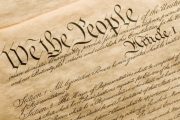Considering it a crime to not report treason when one witnesses it, earlier this week, a bill was introduced to the North Carolina General Assembly that would declare the National Defense Authorization Act unconstitutional and treasonous.
The resolution’s primary sponsors are State Representatives Glen Bradley and Larry Pittman and their bill was referred on Thursday to the Rules Committee of the North Carolina House of Representatives.
In the text of the measure the NDAA is accurately described as “repugnant to, and destructive of, the Bill of Rights of the United States and the constitutions of the United States and the State of North.” In response to this constitutional insult, the North Carolina bill expresses:
OPPOSITION TO THE PROVISIONS IN THE NATIONAL DEFENSE AUTHORIZATION ACT FOR FISCAL YEAR 2012 THAT AUTHORIZE, IN DIRECT VIOLATION OF THE UNITED STATES CONSTITUTION AND THE CONSTITUTION OF NORTH CAROLINA, MILITARY DETENTION AND TRIAL OF UNITED STATES CITIZENS AND LAWFUL RESIDENTS OF THE UNITED STATES.
Expressly cited in the resolution are Articles I, Section 9 (habeas corpus guarantee); Article III, Section 2 (right to a trial by jury); and Article III, Section 3 (the definition of treason). Each of these critical clauses of the Constitution are said to be violated by the NDAA, according to the bill’s authors.
Specifically targeted in H.R. 982 is Section 1021 of the NDAA. Section 1021 places the American military at the disposal of the President for the apprehension, arrest, and detention of those suspected of posing a danger to the homeland (whether inside or outside the borders of the United States and whether the suspect be a citizen or foreigner).
Furthermore, a key component of the NDAA mandates a frightening grant of immense and unconstitutional power to the executive branch.
Moreover, under the provisions of Section 1021, the President is afforded the absolute power to arrest and detain citizens of the United States without their being informed of any criminal charges, without a trial on the merits of those charges, and without a scintilla of the due process safeguards protected by the Constitution of the United States.
Beyond that, in order to execute the provisions of Section 1021 described in the previous paragraph, subsequent clauses (Section 1022, for example) unlawfully give the President the absolute and unquestionable authority to deploy the armed forces of the United States to apprehend and to indefinitely detain those suspected of threatening the security of the “homeland.” In the language of this legislation, these people are called “covered persons.”
The universe of potential “covered persons” includes every citizen of the United States of America. Any American could one day find himself or herself branded a “belligerent” and thus subject to the complete confiscation of his or her constitutional civil liberties and nearly never-ending incarceration in a military prison.
Courageously, Representatives Bradley and Pittman describe these noxious provisions permitting the permanent imprisonment of American citizens without charge or trial as: “injuries and usurpations, all having in direct object the establishment of an absolute tyranny over these states, are nearly identical to many of the long train of abuses and usurpations that compelled our forefathers to take up arms and to separate from Great Britain, as enumerated in” the Declaration of Independence.”
Recently there has been much discussion of the eradication of the panoply of fundamental principles of liberty by the Congress and its attempts to convert the president into a totalitarian dictator with historic powers to apprehend and indefinitely detain American citizens. This author has questioned whether the permission for the absolute abuse of power soon to be codified as part of the National Defense Authorization Act is not a greater act of tyranny than any perpetrated by George III that precipitated the waging of America’s war for independence.
The “long train of abuses” of which Britain’s crown was accused are enumerated in the Declaration of Independence. This historic indictment of King George III was penned principally by Thomas Jefferson and was laid out in a manner both methodical and lyrical. It stood on the rooftops and decried for the all the world to hear the despotic measures levied against the American colonies by the government of Great Britain.
As our own modern government passes one after the other laws eroding the bedrock of freedom upon which our republic was built after the successful waging of the war against English oppression, the specific examples of the abuse of power cited in the Declaration of Independence seem eerily familiar (the North Carolina resolution calls the similarity “shocking and obvious”) and may someday embolden us in our efforts to restore liberty and the constitutional boundaries of government.
For all the foregoing reasons, the North Carolina General Assembly, should it pass H.R. 982, would declare the offensive provisions of the NDAA of 2012, null and void from their inception and are not enforceable in” their state and would make it the “express policy of [the state] legislature that no officer, employee, or agent of the State will implement, enforce, or otherwise support, directly or indirectly, any of the unconstitutional provisions noted above, and that a violation of such policy will be deemed a violation of his or her oath of office and employment agreement and will subject him or her to disciplinary action up to, and including, termination.”
In light of the failure of the members of the national House of Representatives to fulfill their oaths of office to preserve, protect, and defend the Constitution by repealing the indefinite detention provisions of the NDAA in the 2013 edition, the recorded reasons behind the offering of the North Carolina measure are particularly praiseworthy:
The [North Carolina] House of Representatives recognizes its duty to interpose itself
between unconstitutional usurpations by the federal government or its agents and the people of this State, as well as the duty to defend the unalienable natural rights of the people, both of which are consistent with the Ninth and Tenth Amendments to the Constitution of the United States, and with our oaths to defend the Constitution of the United States and the constitution of this State against all enemies, foreign and domestic.
With North Carolina, there are now 13 states whose legislatures are currently considering some version of anti-NDAA legislation, a fact that brings joy to all those who value our republican form of government and the freedom enjoyed by all Americans.




